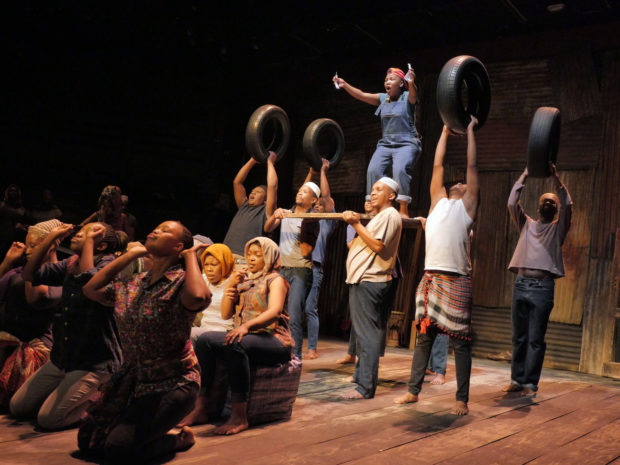You have no items in your cart. Want to get some nice things?
Go shopping
“Trading money for access to a poor person’s private world is fraught with discomfort,” writes Jonny Steinberg in A Man of Good Hope.
His book is now the basis for an opera musical that is touring globally, including a British premiere at the Young Vic. A Man of Good Hope, published in 2015 by Jonathan Cape, charts the story of one refugee, Asad Abdullah. In 1991, he flees his homeland of Somalia to journey across five African countries to set up a shop in South Africa. A need for survival and an unrelenting dream of a better life encourages him to make the treacherous journey to Cape Town, a destination where he finds further hardship. Steinberg, now Professor of African Studies at Oxford University, wrote his account during two years spent with Asad; the interviews took place in a car, the safest space while Asad was in constant fear for his safety. Steinberg asked Asad to access painful memories of his migration from Somalia and sought permission to share them further.
Art can provide an opportunity to work through complicated issues and access private stories in a controlled, safe environment. But, as Steinberg suggests, is this access meant to bring discomfort? How should we understand the exchange? There may be an irony in British audiences paying to watch a theatrical production that transports them into a world, presumably, so different from their own. We are currently experiencing the largest international migration of people and the worst refugee crisis since World War II, and our access points to understanding this are limited. Exchanging money for an artistic product is common – but are we electing to feel discomfort in order to scratch an itch? What level of intimacy and authenticity should audiences be granted?
In keeping with British theatre’s long tradition of exploring the most challenging issues of our time, the Young Vic has programmed a Horizons season, which looks to explore the lives of refugees and allow real-life voices to tell their stories. From Queens of Syria, about Syrian refugees exiled in Jordan, to Now We Are Here, which saw spoken word artist Deanna Rodger collaborate with four refugee from around the globe, the Young Vic has made a considerable commitment to this subject. Vicky Featherstone’s Royal Court is another theatre to have overseen a similar season spotlighting refugee communities.
In wake of the Brexit vote when many Britons feel we are continuing to turn our backs to others, productions like A Man of Good Hope take on additional meaning. The platform of theatre helps people to enact complex issues and to stage stories and aid understanding. We are all bearing witness to the refugee crisis, but Asad’s experience enables us to humanise the tale of a refugee and renders us more empathetic.
The book is adapted by black South African theatre troupe Isango Ensemble, who draw their members from the townships around Cape Town. In their remaginings of Western theatre classics, they have become a byword for colourful exuberance. Their production of Mozart’s Magic Flute, for example, is just that: magic. In Steinberg’s book, Asad recounts the harsh xenophobic abuse he received as an economic migrant, including from black South Africans themselves. Via the collaboration with Isango, the black South African community regain some agency. The result is a soaring musical which denotes the passion and pain of their homeland, the score all thumping percussion, full-throated African choral music and many marimbas (I counted seven).
The exchange of money for private stories is something explored in a recent play at the Almeida, Adam Brace’s They Drink It In The Congo. There, the play’s lead, Stef, returns to the DRC at the end of the play to pay a traumatised man to show her his wound – a wound that has also caused Stef much anguish. It is interesting that the exchange of money refocuses the experience and becomes more about the person paying, as they have now bought the right to feel. While They Drink It In The Congo largely and competently examined white guilt, A Man of Good Hope focuses its energy differently. The production has been co-produced by a long list of partners, yet it feels essentially like a piece created from the region it speaks of. Its quest is not to hold up a mirror to its audience in London: we are merely visitors. Its interest lies, instead, in humanising the plight of refugees and exposing a plethora of colour that is normally muted in what we hear from media sources. The 24 members who make up the ensemble imbue the production with a captivating command: it feels close to the action, and as an audience sitting in London we feel surprisingly connected.
Like Steinberg, audiences seek greater understanding by accessing private stories. What stops it being exploitative is determined by who is making the work. With A Man of Good Hope, and much of the work seen on London stages of late, it feels like authentic voices have been embedded within the text and the creative process has been inclusive. For the past year or so, there have been numerous initiatives to allow refugees to tell their own stories. In this instance, the only sense of discomfort comes from one inexorable fact: we listen to the stories while sitting in a safe space, but the stories themselves are anything but.
A Man of Good Hope continues at the Young Vic until November 12. Tickets are available from £10.

About Rebecca Latham
Graduating from Sydney University in 2012, Rebecca moved back to England to pursue a career in Theatre. She has most recently been Project Administrator on The Old Vic 12 and in the past has worked with Raindance Film Festival and Arcola Theatre. She has been writing reviews for A Younger Theatre since 2013 and is interested in Theatre, Film and Literature.




